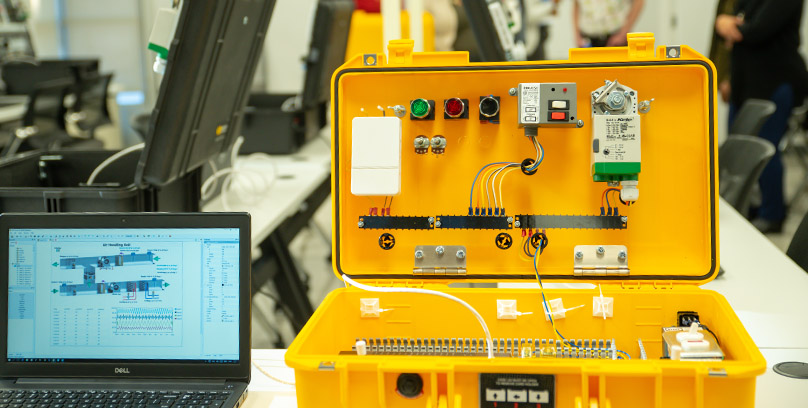
Workforce Development
Building Smarter, Greener Futures at Roxbury Community College
The Commonwealth of Massachusetts and the City of Boston are leading the nation in addressing two of the most pressing challenges of our time. The Commonwealth and the City are aligning the effort to maximize the energy efficiency of buildings with the effort to maximize opportunities for residents of underserved areas to obtain high-paying, secure jobs in the green economy.
A green pathway to high-paying jobs
The opportunity to create thousands of high-paying jobs right here in Massachusetts has arisen because of the explosive growth that our state has seen in the construction of high-performance (aka “smart”) buildings. The intent behind the design of smart buildings was to leverage the power of automated processes to optimize energy performance and overall life cycle performance.
The concept was both sound and forward-thinking, but a key component of the energy efficiency equation was missing. The technology required to run these buildings was becoming more complicated by the day. It reached the point where smart buildings could only achieve superior energy performance if they were operated by technicians who possessed in-depth knowledge of both mechanical systems (pumps, boilers, air handling units, etc.) and the software (the building automation system) that coalesces the operation of individual pieces of equipment into an integrated and harmonized system.
Because there was a shortage of people with this unique blend of skills, many new smart buildings had lackluster energy performance. Thus, if a hospital, university, school district, corporation, or government agency made the decision to build a sleek, new high performance building, these organizations would not always get the return on investment in green systems that they expected. An added dimension to this challenge was that when these entities would invest time and money in staff training, the operations staff that they trained would be hired away by other companies at a higher salary. It was a classic case of supply and demand, where employers were competing for talent and willing to pay top dollar for people with the right skills.
Converting challenges into opportunities
Where many saw an unresolvable problem, companies like Skanska saw an opportunity to help people in gateway communities to obtain high paying jobs and to help building owners obtain employees with the technical know-how to run smart buildings in the greenest way possible. Through Skanska’s efforts, an industry consortium was formed that included area hospitals, universities, utility companies, state agencies, the City of Boston, and controls companies. This consortium held a series of visioning sessions with RCC’s president, Valerie Roberson, and members of RCC’s senior administration, in which the concept of creating a building automation systems training program at RCC was tested, refined, and validated. It was a true partnership between public and private entities, a model for future public-private collaborations than can be replicated statewide in any number of industries.
By working closely with industry partners like Skanska, Roxbury Community College (RCC) has now launched the Center for Smart Building Technology (C4SBT). One of the first such centers in Massachusetts, this highly-innovate program offers preparation for careers in energy efficiency and smart building technology. In addition to providing Boston residents with the training needed for successful careers in the green energy industry, the Center’s programs support the goal of making Boston a carbon-neutral city by 2050.
“The smart building technology programs offered at our nation’s community colleges have opened the door for a greener, more sustainable, and more inclusive future.”
RCC’s Center for Smart Building Technology
The non-credit programs offered by the C4SBT are designed to prepare working professionals for nationally-recognized certifications. Current courses include:
- Building Operator Training
- LEED Green Associate v4
- Building Automation Systems Fundamentals
- HERS Training
- G|PRO Fundamentals of Building Green
Students hoping to earn an associate’s degree before beginning their careers in facilities management or engineering can pursue a degree in engineering at RCC and take specialized, credit-granting courses focused on smart building technology.
RCC’s Center for Smart Building Technology is committed to providing the training needed to obtain well-paying jobs in a rapidly-growing industry, ensuring that the green energy workforce is trained to achieve the City’s and the Commonwealth’s carbon emission reduction goals.
Select one of the panels below to learn more about RCC’s smart building technology programs or the variety of advanced technology program options at Bunker Hill Community College.

